Tokyo Olympics 2021: How many Australians will march at opening ceremony because of restrictions
Despite the opulence of the opening ceremony being scaled back in Tokyo, Australia’s official number of those allowed to march is not part of that package.
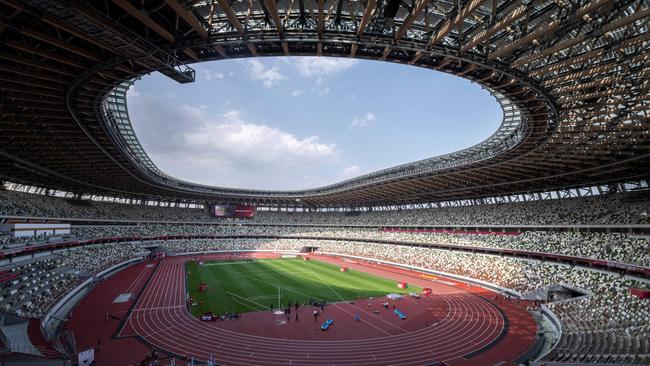
Olympics
Don't miss out on the headlines from Olympics. Followed categories will be added to My News.
Just one in 10 Australian athletes competing at the Tokyo Olympics will march in the opening ceremony on July 23.
Australian chef de mission Ian Chesterman announced that as few as 50 athletes including flag bearers Patty Mills and Cate Campbell will march, along with just six officials.
In late developments another 16 athletes have been added to the Australian Olympic team taking the current numbers to 488.
Chesterman said the low numbers athletes marching were largely because of Covid restrictions which prevent athletes checking into the Olympic village until five days before their competition.
Kayo is your ticket to the best local and international sport streaming Live & On-Demand. New to Kayo? Try 14-days free now >
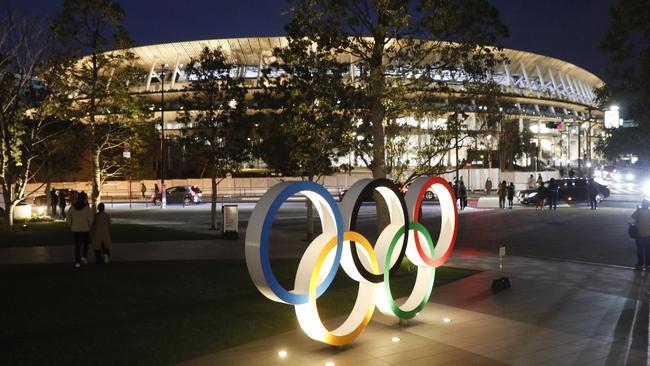
“I think 50 is a pretty good number when you consider with these games athletes can only arrive just before you compete and those that will compete in the second week (of competition) won’t even be in Tokyo (for the opening ceremony),’’ he said.
Some other athletes will be looking to minimise contact so that they are not ruled out of their competitions because of any contact with a positive Covid case.
Ninety eight per cent of Australian athletes will be fully vaccinated, Chesterman said, adding that in the Olympic village he believed 85 per cent of all international athletes will be vaccinated.
Under the Tokyo 2020 rules, athletes can still compete despite being considered a close contact of a positive case if they can show they have been wearing their mask at all times.
More than 80 athletes marched at the Rio 2016 Olympics.
Japanese officials have already scaled back the opulence of the opening ceremony to reflect the difficulties faced around the world in dealing with the pandemic.
In Tokyo there are mixed feelings about the Olympics going ahead and the mood of the city is muted, especially as athletes and officials are banned from walking outside and mixing with the locals.
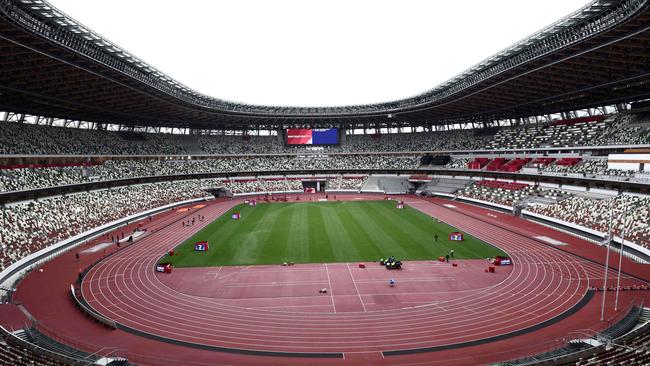
However a huge influx of athletes will arrive this weekend which will create more of a buzz in the Olympic village.
Chesterman said these Olympics will give a generation of youth something other than Covid to focus upon.
He said his children had “only heard of Covid, Covid, Covid” in the past 18 months, but that with the outstanding triumph of Ash Barty at Wimbledon and the upcoming Olympic competition it will provide the younger generation with a huge boost to their morale.
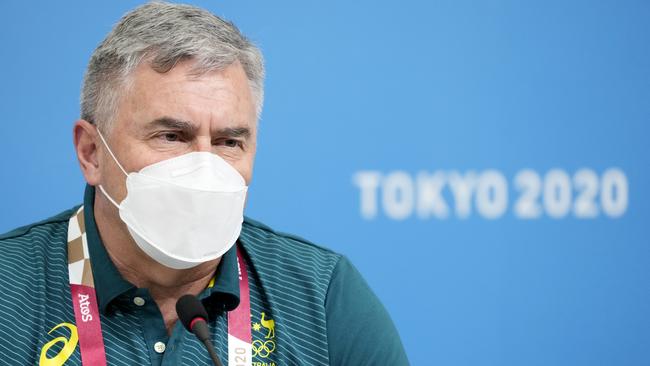
He said on Monday at the first Australian press conference in Tokyo: “I am very excited about the Games, excited about our athletes getting out there to compete. The morale of this team is going to be fantastic, we have been through a lot, there has been great adversity, yet they’ve managed to get to Japan and come together.
“I think there’s a special spirit in the Australian team and a special spirit in the Olympic village because it's the same for all 206 countries coming together and creating something very memorable.”
Bach: Low numbers heartening as Games near
Just three out of more than 8000 people involved in the Olympic Games have tested positive to Covid-19 upon their arrival in Japan this month, officials announced, as the Japanese Prime Minister Yoshihide Suga welcomed the International Olympic Committee president Thomas Bach at a meeting in Tokyo on Wednesday.
The Japanese government has also approved sensitive visits by Bach and the Australian IOC vice-president John Coates to Hiroshima and Nagasaki this Friday, despite some local objections, in order to mark the beginning of the Olympic Truce.
The low Covid infection rate — which includes a Ugandan boxer and coach and another unidentified person, comes after strict pre-entry Covid testing requirements in Japan.
Most arrivals have had to undergo up to three Covid tests before boarding their flights and everyone is subject to an additional test upon arrival at a Japanese airport.
The statistics are heartening for Suga, who has staked his political future on continuing with the Games despite a split among the Tokyo public about whether the Games should go ahead amid slowly rising case numbers of the coronavirus.
Suga faces elections immediately after the Games and is relying on a strong Japanese performance at the Game to boost domestic morale.
Bach said the Games “will unite the world in all our diversity, they will show that we are stronger together in all our solidarity” as he praised the organising committee, the volunteers and staff.
He added: “The IOC is sitting in the same boat and we are rowing in the same direction, enjoying the full support of the government of Japan.’’
Bach emphasised that most participants in the Games have been vaccinated against the virus.
He said 85 per cent of the Olympic athletes and support staff in the Olympic village have been vaccinated, despite inoculations being only recommended and not mandatory.
Nearly 100 per cent of the IOC members and IOC staff have been vaccinated or have immunity, while between 70 to 80 per cent of media representatives have been vaccinated.
Bach said:’’these Games will be followed by billions of people around the globe. They will admire what the Japanese people will have achieved under these difficult circumstances.’’
How Olympics opening ceremony works and who marches
Fans may be banned from Tokyo’s stadiums and arenas but more than 50 Australian athletes will march on July 23 at the opening ceremony of the Olympic Games.
International Olympic Committee vice-president John Coates, in Japan as preparations reach the final stretch, confirmed Australia would also be sending one of the largest teams of athletes to Japan.
A fixture of the Olympics for more than 30 years, Coates said while there may not be clapping and cheers at the opening ceremony, there will be tears from those in attendance and watching at home.
On Thursday, the Japanese government put the capital under a COVID-19 state of emergency because of rising new infections and the highly contagious delta variant.
The declaration was made by Prime Minister Yoshihide Suga, and the spectator ban was agreed to by Japanese Olympic organisers, the IOC, the International Paralympic Committee, and the metropolitan government of Tokyo.
It means the Olympics will be a largely TV-only event.
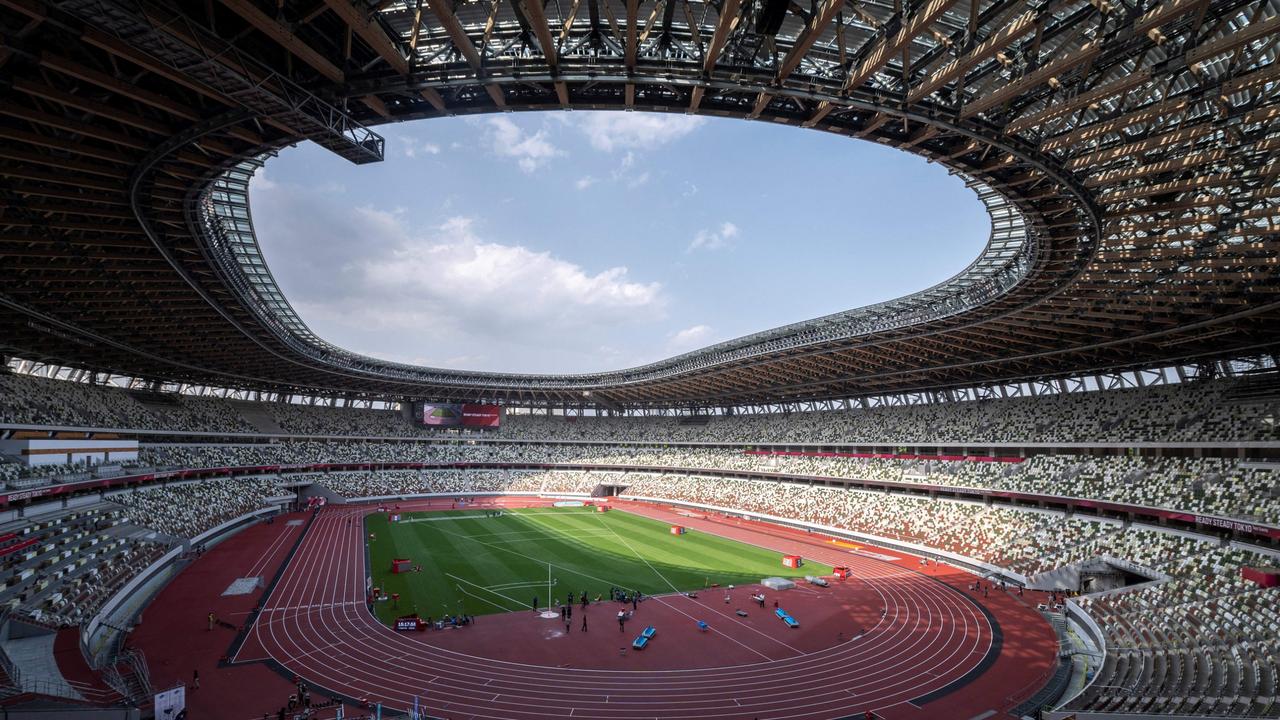
But Coates stressed the recent declaration resulted in no change to competition and that the likes of Australia’s softballers could still play in front of 10,000 people.
The ban covers Tokyo and three surrounding prefectures — Kanagawa, Saitama and Chiba.
Some events in outlying areas, like softball baseball in the northeastern prefecture of Fukushima, will allow a limited number of fans.
“Fukushima, which is hosting our girls in the first softball game of the Olympics against Japan, they are still able to have 10,000 at that venue,” Coates said.
“And if the (Covid) situation improves significantly we can review numbers again.
“As of right now, we think 51 athletes including Patty Mills and Cate Campbell (Australia’s flag bearers) will march in the opening ceremony.
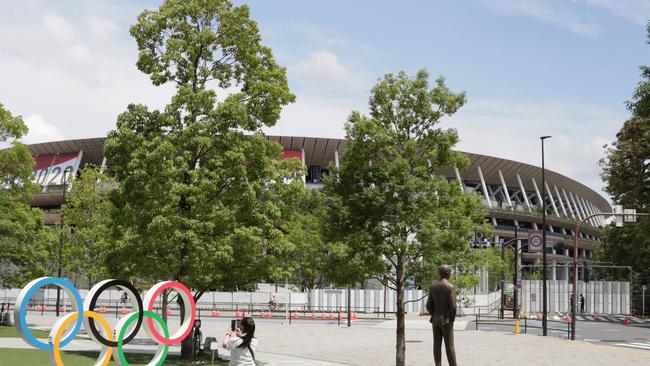
“This compares favourably to what happened in Rio where we had numbers in the mid 70s. In previous Games … we used to be able to fill spare places with coaches and officials … that is not happening this time.
“Also bear in mind that none of the athletes competing in the second week will be there so the comparative figure of 51 to mid 70, I am thrilled by this figure. I think we will have one of the third or fourth largest team at these Games.
“And the opening ceremony will be great. I have seen the story book and (even) an old bloke me was reduced to tears.
You might not be able to shout or clap but you will be able to cry.
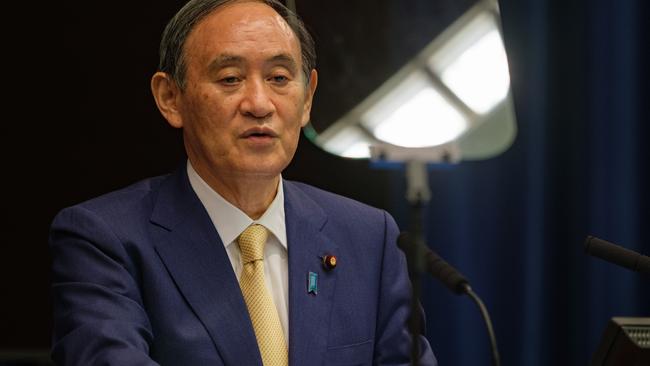
“The Olympics are always about giving the opportunity to kids to compete and to test themselves against the best in the world.
The state of emergency begins July 12 and runs through August 22.
The Olympics, which open July 23 and run through August 8, fall entirely under the emergency period, while the Paralympics open August 24.
Olympic Minister, Tamayo Marukawa, reinforced some venues outside Tokyo would still allow fans up to 50 per cent of capacity.
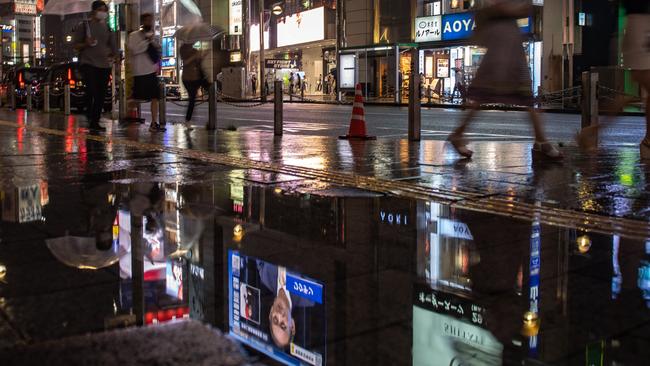
In addition to Fukushima, this includes Miyagi, the venue for some football matches, and Shizuoka, where cycling will take place.
Since the Olympic Village opened up to athletes, two Ugandans and one Serbian rower has tested positive to Covid.
They have since been isolated.
Mr Coates said: “We are getting 500 athletes coming in per day at the moment … and the system is working to protect athletes.
“Up to 85-90 per cent of the Olympic Village will be vaccinated and there are protocols in pace preventing athletes from contact with Japan’s public.”
More Coverage
Originally published as Tokyo Olympics 2021: How many Australians will march at opening ceremony because of restrictions





